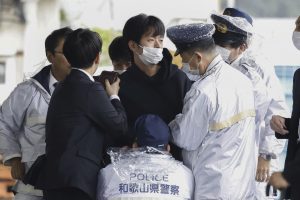A 24-year-old man who allegedly threw an explosive at Prime Minister Kishida Fumio wanted to be a politician and believed that he was unfairly blocked from running for Japan’s parliament by an age requirement and costly registration fees, according to media reports and social media posts that appeared to be his.
The suspect, Kimura Ryuji, was wrestled to the ground and arrested Saturday at a campaign event in the fishing port of Saikazaki, in the western Japanese city of Wakayama. The explosive, believed to be a pipe bomb, landed near Kishida, who escaped unhurt.
Kimura has refused to talk to police, but local media reports that he bore grievances about Japan’s election system might shed light on his motives.
In June last year Kimura, who police said is unemployed, filed a lawsuit with the Kobe District Court claiming that he should have been allowed to register for the July 2022 upper house election, according to Japanese media including NHK public television and Kyodo News. A candidate must be aged 30 years or older and present a 3 million yen ($22,260) deposit to run for the upper house, the less powerful of Japan’s two-chamber parliament. Kimura was 23 at the time.
He demanded the government pay 100,000 yen ($740) in compensation for his psychological anguish, according to the reports.
Violent crimes are rare in Japan. With its strict gun control laws, the country has only a handful of gun-related crimes annually, most of them gang related. But in recent years Japanese police have worried about “lone offender” attacks with homemade guns and explosives. Former Prime Minister Abe Shinzo was assassinated with a homemade gun at a campaign event on July 8, just two days before the upper house election.
The man accused of shooting Abe, Yamagami Tetsuya, told authorities soon after his arrest that he killed Abe because of the former prime minister’s apparent links to a religious group that Yamagami hated. In statements and in social media posts attributed to him, Yamagami said his mother’s donations to the Unification Church bankrupted his family and ruined his life.
Kimura argued in a document he submitted to the court that the election system that blocked his candidacy was unconstitutional, the reports said.
Kimura argued that the election law violates constitutional guarantees of equality and other rights, according to media reports. The court dismissed his claim in a November 2022 ruling, and Kimura appealed the decision to the Osaka High Court, whose decision is expected in May, reports say.
Tweets posted to an account cited by local media as Kimura’s and seen by the Associated Press complained about Japan’s political system. The account does not carry his name, but identifies itself as representing the plaintiff in a lawsuit that matches the one filed by Kimura. The Associated Press was not able to contact the owner of the account. The account had only 23 posts since it began in late June of 2022.
An August 11, 2022, tweet said the deck is stacked against ordinary people who quit their job and pay the deposit to run in national elections. “There is an established system where ordinary people can never become politicians.”
Other tweets on the account criticized Kishida’s decision to hold a state funeral for Abe and disparaged the role of the Unification Church, and other religious groups, in political campaigns.
Jeffrey Hall, a lecturer at Kanda University of International Studies, pointed out that the account’s final tweet, posted on April 11, called Japan a “democracy-style tyrannical state.”

































